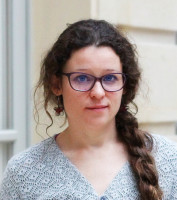Climate Change
Terrestrial Biodiversity
Insects & Microorganisms
Climate Adaptation & Resilience
Ecosystem Services
Agriculture, Crops & Soil Health
Post-Doctoral Fellowships
France
2017.11.30
How will climate change impact pollination ?
Many flowers produce a scent. This scent is a mixture of molecular compounds released by the flower into the atmosphere. The flower’s structure, colour and odour are critical cues in attracting pollinators. « We know that climate change will affect plant volatile emissions. To preserve and restore biodiversity and ecosystems functions, we need to know how exactly », Dr. Coline Jaworski stresses. « This is precisely what the project is about, understanding the mechanisms by which climate change affects all the plants and pollinators species in a community and their interactions », she continues. « This way, we can develop new tools and expectations on the resilience of these pollination networks ».
Using floral emissions to restore and protect pollination
The choice of the area of Marseille as the study area is not random. The Mediterranean Basin encompasses more than 50% of European bee species. Around Marseille, plants are adapted to extremely arid regions and some of the most abundant species, like rosemary and thyme, have particularly strong scents. In addition, the area has a variety of climatic conditions, with different gradient of aridity, and a history of fire events. « Field work will consist of collecting data on both the plants and the pollinators that inhabit natural plant communities around Marseille. We will record the pollinator’s visits to the plants, check their identity, catch some specimens and capture floral scents that will later be analysed in the lab », Dr. Coline Jaworski specifies. This will help achieve the first two goals of the project : characterizing both the impact of climatic conditions on the structure of pollination networks and the floral scent emissions of plant species embedded in those networks. Once complete, these steps will help pave the way for the remaining two aims: analyzing how changes in pollination networks relate to changes in floral emissions and finally, determining how to restore and protect these pollination interactions using floral emissions.
Recent research shows that, as temperatures and aridity increase, the scent of flowers is disturbed. By aiming to provide insight into this alarming phenomenon, Dr. Coline Jaworski post-doctoral research is addressing one of tomorrow’s biggest challenges. In her own words, « understanding how plants and pollinator interact and assemble into pollination networks is a historic, fascinating challenge in ecology, where recent human-driven changes urge for rapid progress ». Her findings will not only lead to tangible recommendations to preserve and restore Mediterranean pollination networks, they will also propose a new framework of action for the preservation of pollinator communities worldwide.
How will climate change impact pollination ?
Dr Coline Jaworski tells you more about the field work of her project
DISCOVER MORE
Coline
JAWORSKI
Institution
Institut Méditerranéen de Biodiversité et d'Ecologie
Aix-Marseille Université (AMU)
Country
France
Nationality
French
Related articles
Climate Change
Finance, Investment & Risk Management
Societal Challenges
Climate Adaptation & Resilience
Insurance & Risk Management
Environmental Justice
Civil Society & Governance
AXA Project
Italy
AXA Research Lab on Climate Change, Risk and Justice
In response to three research questions: How can the private and financial sectors contribute to a just transition to a... Read more

Gianfranco
PELLEGRINO


